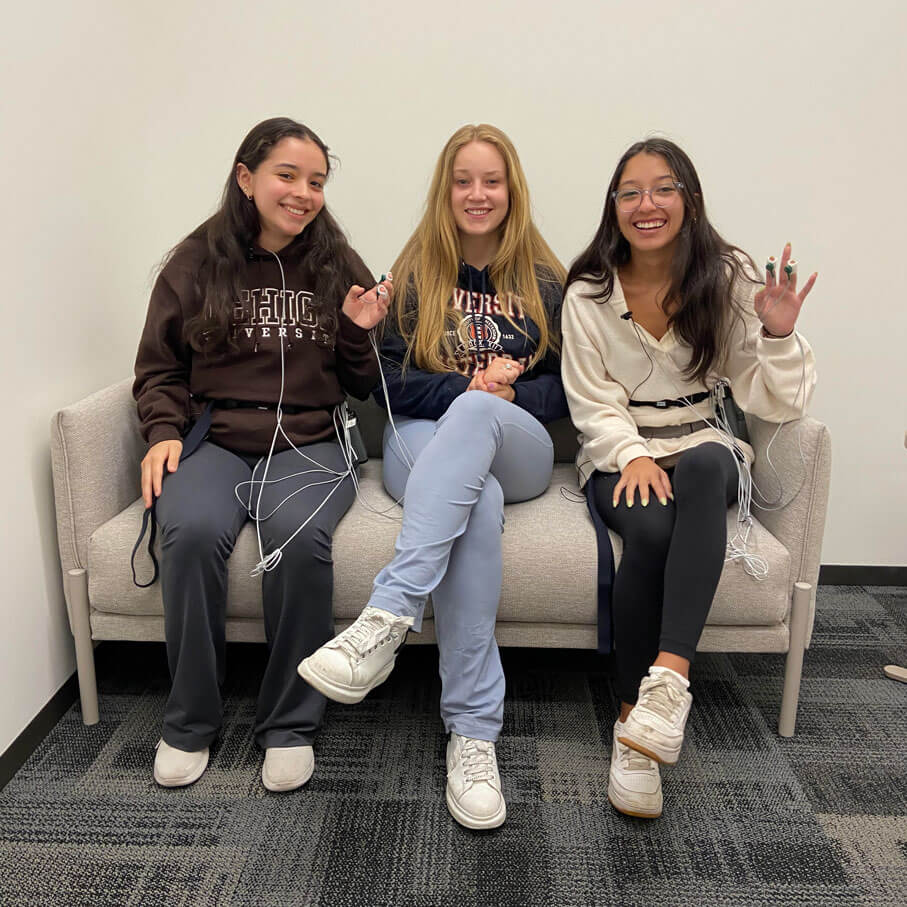It’s been said that in the cookie of life, friends are the chocolate chips — they can add a serendipitous sweetness to the mundane. Friendships are important at all stages of life, but particularly in adolescence, where research says they can be predictors of future adult relationships.
Sarah Borowski, assistant professor of psychology, is conducting research as director of Lehigh’s Peer Relations Lab to identify and explain how the behavioral, physiological, and emotional mechanisms of interactions between close friends affect adolescents’ development and well-being.
How does your study work?
Adolescents initially come into our lab with their friends, in pairs, and answer a battery of questions about their friendship and how they’ve been feeling lately, how they manage emotions on their own, and different stressors that they’re currently experiencing. Then they each pick a personal problem that they currently have that they would be okay talking to their friend about. They put on equipment that measures heart rate, breathing, and how much their hands sweat. Then they sit in a room with their friend for 16 minutes while we record their physiological responses, as well as video and audio record their conversations while they talk about the problem.
 What are you looking for?
What are you looking for?
My research team and I look at the different behaviors that they exhibit when they’re talking in what we call a micro-social way. So when one friend says, ‘Hey, I’ve been feeling bad about my friendships lately,’ what does the other friend respond with? Do they say, ‘Oh, that’s silly,’ or do they say, ‘I’m so sorry you feel that way!’ And we can see how their physiology is changing in the moment and how that predicts their adjustment over time.
What do you expect to find?
One of the things my previous research found is that when friends are especially supportive and validating, adolescent friends exhibit co-regulation — their physiological responses are linked. We might expect that to be a very positive thing, but we don’t know that yet. When friends provide support and validation exhibited by co-regulation, over time that may support better individual regulation. It may be related to increases in positive relationship quality and perhaps even decreases in depressive symptoms. Our adolescent study participants will come back in a year — they don’t have to come back with their friend. We ask them the same questions that they answered at the beginning of the study. This can tell us if their relationship quality is changing. Are their stress levels changing over time? How has managing their emotions changed?
How important are adolescent friendships?
They’re different from other relationships because they’re egalitarian and voluntary. They’re unique for conflict resolution. With a sibling, you might be able to punch them, but they still have to be your sibling. Not so with a friend — you have to consider their point of view and come up with solutions that work for both of you. Friendships are important as well for intimacy, for disclosure and support that supersede the parent relationship. There’s neurological research showing that adolescents’ reward centers in the brain light up like Christmas trees when their friends are present. Adolescent friendships set the stage for later relationships.
What advice do you have for helping teens make friends?
Friends tend to be similar to one another so that similarity is a great starting point — having common ground can be an important foundation for a relationship. They can build closeness by disclosing to a friend and supporting their friend’s disclosures. And it helps for them to be self-aware of the behaviors they’re exhibiting when they talk to other people. Things that distance others include conversational self-focus — always bringing the conversation back to yourself. Paying attention to how much they’re talking and how much their friend is talking. Constantly seeking positive feedback from others is distancing, needing excessive reassurance. Anger regulation is important, too. It’s really all about balance – disclosing about yourself but also listening to your friend and providing that support to them.
Borowski’s research in the Peer Relations Lab is ongoing. If you know of an adolescent aged 14-17 who might be interested in participating in the study, encourage them to learn more about how to register and participate in research.